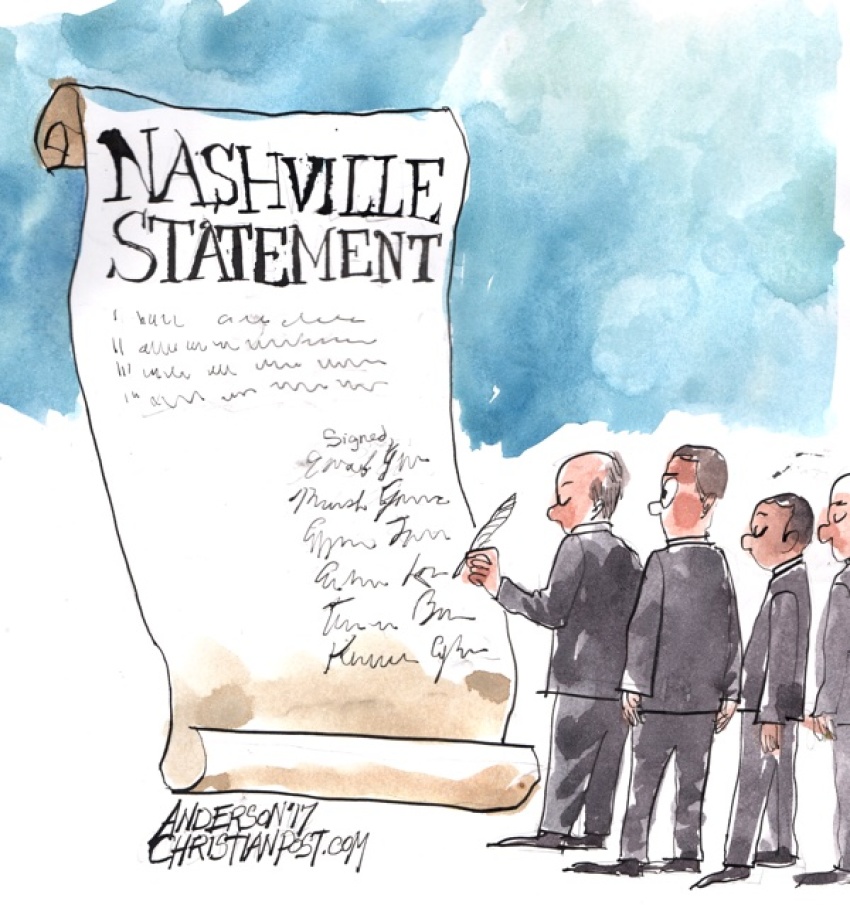Evangelicals Reaffirm Support for Nashville Statement at Symposium Marking 1-Year Anniversary

Evangelical leaders who signed onto a statement reaffirming traditional Christian teaching on sexual ethics and gender have reaffirmed their support at a symposium held on the anniversary of its release.
Known as the Nashville Statement, the declaration was released in August 2017 and signed by more than 20,000 evangelical leaders, activists, and theologians.
Notable signatories included: Denny Burk, president, Council on Biblical Manhood and Womanhood; John Piper, founder of Desiring God and chancellor of Bethlehem College & Seminary; Dr. James Dobson, former head of Focus on the Family and founder of Family Talk; Karen Swallow Prior, professor at Liberty University; Fred Luter, the first African-American president of the Southern Baptist Convention; and David French, columnist with the National Review.
The Council on Biblical Manhood and Womanhood, which organized the statement, held a symposium on Saturday that featured notable evangelicals reflecting on the impact of the statement.
Burk, who was among them, explained that he didn't envision the statement as a "culture war document" that advocates public policy, but rather a "manifesto aimed ... at ourselves."
"Long before anyone was debating gay marriage, there was a softening of marriage norms among evangelical Christians. Many evangelical congregations and ministries have acquiesced to divorce culture, pornography use, sexual immorality, and lack of church discipline," said Burk.
"Because of this erosion of evangelical integrity on issue of sexual morality, it was past time for evangelicals to get their own house in order. Evangelicals needed to recover and reassert what Christ's Church has always believed. And that is why we drafted the Nashville Statement when we did."
Rosaria Butterfield, an ex-lesbian who also signed the statement, explained that she was still "grateful" to have signed it.
"I am grateful for the clarity that this conflict has produced, for the lines that have been drawn, for the prayer and fasting and return to biblical clarity that has been launched," stated Butterfield.
"The Gospel is on a collision course with homosexuality as a category of personhood. But the Gospel also offers hope to those who find themselves at the intersection of this conflict."
Albert Mohler Jr., president of The Southern Baptist Theological Seminary in Louisville, Kentucky, said in his symposium comments that the statement offered "clarity" in an "age of confusion."
"A year after the statement was released, I am ever more convinced that the statement was necessary, timely, and right," Mohler said.
"The Nashville Statement is so important that, looking over the last year, I really can't imagine what we would have done without it."
Russell Moore, president of the Southern Baptist Convention's Ethics & Religious Liberty Commission, called the statement "merely an affirmation of what every single corner of the Christian Church has believed — always and without exception."
"Looking back, what should be surprising is that the Nashville Statement generated any attention whatsoever in the outside world," said Moore. "That some thought such an affirmation of orthodoxy was newsworthy says less about the Church and more about the world."
In addition to nonreligious criticism, some liberal Christians were also critical of the Nashville Statement upon its release, including Rachel Held Evans who argued in a series of posts on Twitter that the declaration harms LGBT individuals.
"What kind of twisted expression of 'love' declares parents who accept their LGBTQ kids outside the faith, leads to suicides, secrets & pain?" she tweeted last year.
"'We misrepresent you because we love you. We single you out, stigmatize, & marginalize you because we love you.' It's downright abusive."
Pastor Josh Daffern of MTV Church in Columbus, Mississippi, wrote in a Patheos blog entry last year that while he agreed with the points of the statement, he felt the document lacked pastoral wisdom.
Daffern mentioned that he has a lesbian woman who has been attending his church for about a month and is reportedly battling addictions and is struggling with several other issues in her life.
"If I preached on the Nashville Statement and declared my allegiance, would that help or hinder her own spiritual journey?" he inquired at the time.
"Why would I be more comfortable with pastors and not Christian academics creating this document? Because orthodoxy divorced from relationships can many times lead to rhetoric that hinders (not helps) us achieve our overall mission, to lead all people to Jesus."



























